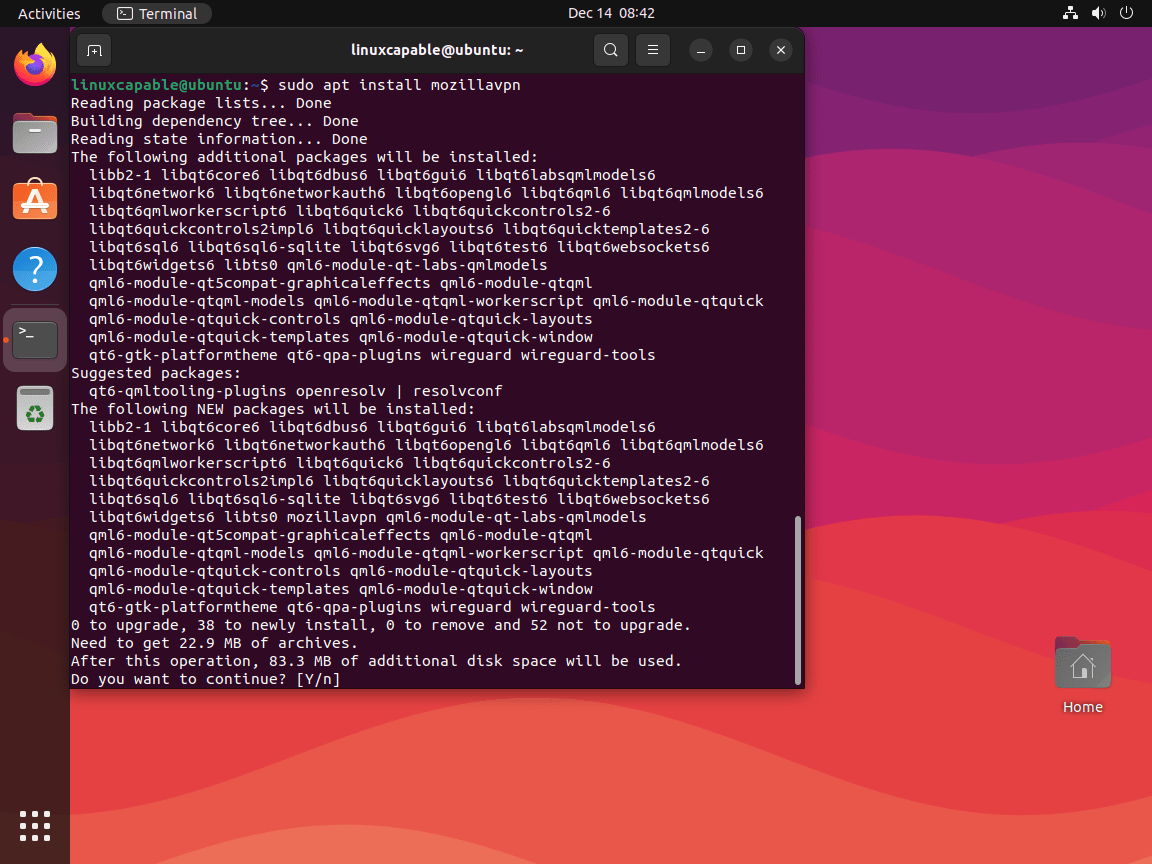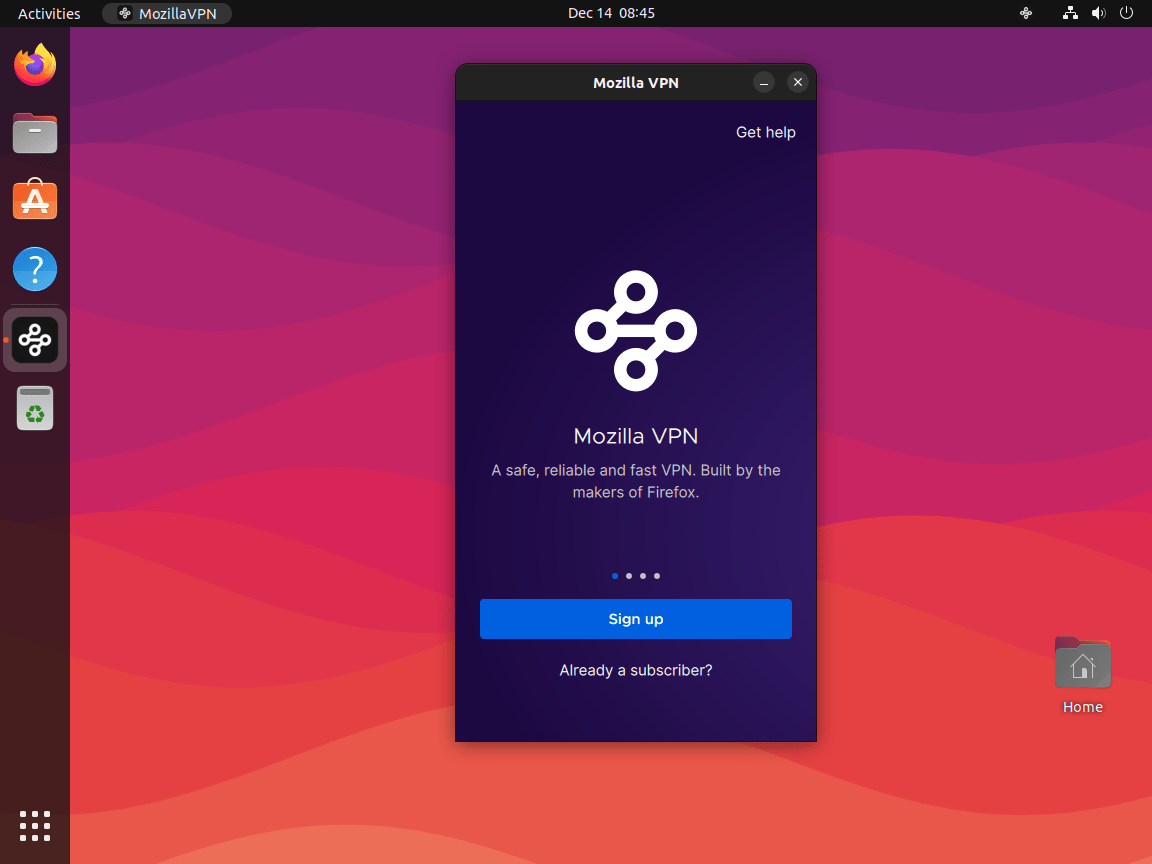Mozilla VPN encrypts your internet connection using the modern WireGuard protocol, protecting your browsing activity from ISPs, public Wi-Fi snoopers, and trackers. Whether you need to secure remote work connections, access region-restricted content, or simply browse with peace of mind, Mozilla VPN provides a straightforward solution backed by Mozilla’s privacy-first reputation. By the end of this guide, you will have Mozilla VPN installed and ready to connect through servers in over 30 countries.
Mozilla VPN is a subscription-based service that protects up to five devices simultaneously with no bandwidth limits or logging. Unlike free VPN alternatives, Mozilla’s paid service ensures consistent speeds and a strict no-logs policy verified by third-party audits. If you are exploring other privacy-focused tools, you might also consider installing the Brave browser on Ubuntu for additional tracking protection.
The following sections walk through adding the official Mozilla PPA repository, installing the VPN client, and managing updates. Additionally, you will learn how to switch between stable, testing, and nightly builds depending on your needs.
Import MozillaVPN PPA
Update the Ubuntu System before MozillaVPN Installation
Before proceeding with the installation, first ensure your Ubuntu system is fully updated. This step prevents package conflicts and ensures you have the latest security patches.
Execute the following commands in your terminal:
sudo apt update
sudo apt upgradeThe first command refreshes the package index, while the second applies any pending upgrades. Once complete, you can proceed with adding the MozillaVPN repository.
Importing MozillaVPN Repositories
This guide supports Ubuntu 22.04 LTS and 24.04 LTS installations. The MozillaCorp PPA typically supports the two most recent LTS releases, but availability may vary after future Ubuntu LTS releases. Commands shown work identically on both supported LTS releases.
Mozilla VPN offers three PPA installation options depending on your stability preferences. The stable repository is the recommended choice for most users, while testing and nightly options provide early access to new features.
Stable MozillaVPN Repository
To import the stable MozillaVPN PPA, use the following command:
sudo add-apt-repository ppa:mozillacorp/mozillavpn -yThis command adds the official MozillaVPN stable repository to your system and automatically imports the signing key.
Testing MozillaVPN Repository
For users interested in testing new features, the MozillaVPN testing repository is available:
sudo add-apt-repository ppa:okirby/mozilla-vpn-testing -yThis repository contains pre-release versions of MozillaVPN for testing purposes. However, keep in mind that pre-release builds may contain bugs not present in the stable version.
Nightly MozillaVPN Repository
The nightly repository is updated daily with the latest development changes:
sudo add-apt-repository ppa:okirby/mozilla-vpn-nightly -yThe nightly PPA receives updates daily, so you must run
sudo apt update && sudo apt upgradefrequently to stay current. For most users, the stable or testing repositories provide a better balance between new features and reliability.
Refresh APT Package Index
After adding the desired MozillaVPN repository, refresh your APT package index to ensure the latest package information is available. While add-apt-repository automatically updates the cache when adding a PPA, running an explicit refresh is good practice before installation:
sudo apt updateFinalize MozillaVPN Installation
Install MozillaVPN Using the APT Command
With the MozillaVPN PPA successfully imported, you can now install the VPN client. APT, Ubuntu’s package manager, handles the download, dependency resolution, and installation automatically. Run the following command in your terminal:
sudo apt install mozillavpn
Verifying the Installation of MozillaVPN
After installation completes, verify that MozillaVPN is correctly installed by checking its version. This confirms both the installation and that the application is accessible from your terminal:
mozillavpn --versionThe output confirms the installed version:
Mozilla VPN 2.32.0
If the version number appears as shown above, MozillaVPN is ready to use. The exact version may differ depending on when you install, as Mozilla regularly releases updates.
Launching MozillaVPN
Launch MozillaVPN from Terminal
If you prefer working directly in the terminal, or if the terminal window from the installation is still open, you can launch MozillaVPN immediately with a single command. This method is also useful for troubleshooting, as any error messages appear directly in the terminal:
mozillavpnLaunch MozillaVPN from Applications Menu
Alternatively, you can launch MozillaVPN through the graphical application menu. This method is convenient for daily use and integrates with your desktop environment. To locate the application:
- Click on ‘Activities’ at the top left corner of your screen.
- Select ‘Show Applications’ to view the list of installed applications.
- Scroll through the applications or use the search function to find ‘MozillaVPN’.


Managing MozillaVPN
Update MozillaVPN
To update MozillaVPN along with your other system packages, run the standard APT update commands:
sudo apt update
sudo apt upgradeAlternatively, if you want to update only MozillaVPN without upgrading other packages, use the single-package update command:
sudo apt update
sudo apt install --only-upgrade mozillavpnThis approach is useful when you want to apply a specific security patch or feature update to MozillaVPN without touching other packages on your system.
Remove MozillaVPN
If you decide to uninstall MozillaVPN, first remove the package along with its configuration files:
sudo apt remove --purge mozillavpnMozillaVPN installs numerous Qt6 libraries as dependencies. After removal, clean up these orphaned packages to free disk space:
sudo apt autoremoveIf you are certain you will not reinstall MozillaVPN, remove the PPA repository you added earlier. Run only the command matching the repository you originally imported:
# For stable PPA:
sudo add-apt-repository --remove ppa:mozillacorp/mozillavpn -y
# For testing PPA:
sudo add-apt-repository --remove ppa:okirby/mozilla-vpn-testing -y
# For nightly PPA:
sudo add-apt-repository --remove ppa:okirby/mozilla-vpn-nightly -yFinally, verify the removal by refreshing the package cache and checking that MozillaVPN is no longer available from the PPA:
sudo apt update
apt-cache policy mozillavpnIf the removal was successful, the output will show no installation candidate:
mozillavpn: Installed: (none) Candidate: (none) Version table:
On Ubuntu 22.04, you may see an older version listed from the universe repository, but this confirms the PPA has been successfully removed.
Conclusion
You now have Mozilla VPN installed on Ubuntu, configured to receive updates from Mozilla’s official PPA. To maintain security, keep the application updated and consider connecting automatically at startup through the VPN settings. For additional privacy hardening, you can combine VPN usage with UFW firewall rules on Ubuntu to control which applications can bypass the tunnel.



Formatting tips for your comment
You can use basic HTML to format your comment. Useful tags currently allowed:
<code>command</code>command<strong>bold</strong><em>italic</em><a href="URL">link</a><blockquote>quote</blockquote>